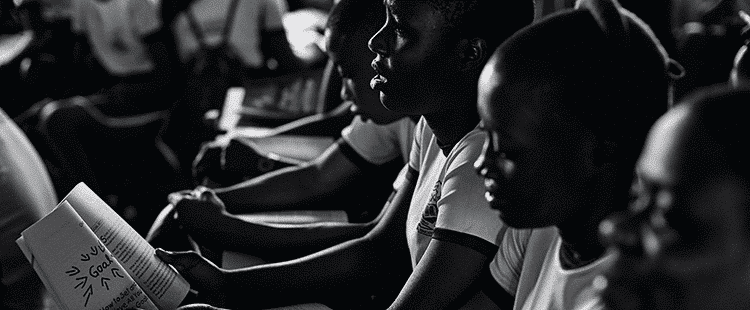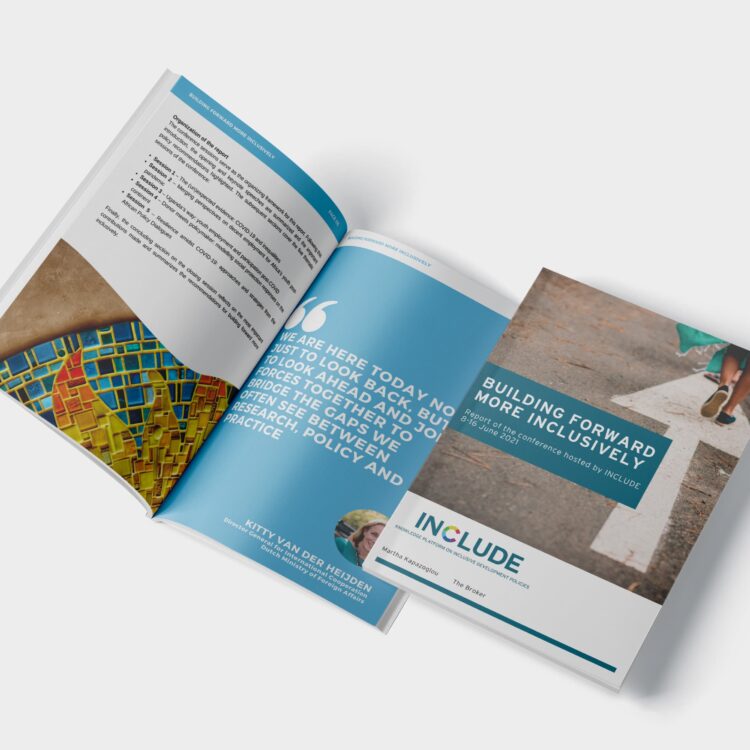
The Sustainable Development Goals (SDGs) mark the importance of the concept of inclusive development. With an emphasis on inequality, resilience and sustainability, the SDGs aim to ‘leave no one behind’. Dutch development policy is increasingly geared towards inclusive development, as reflected in the letter from Minister Ploumen to the Dutch parliament. The Dutch National Research Agenda (NWA) can help to achieve inclusive development in two ways: first, by studying the diverse range of issues related to inclusive development, including how inclusive development policies work in different contexts. Second, through improved partnerships for gathering and disseminating the knowledge relevant to development policies by including a wide range of stakeholders in the different stages of research. Three conclusions stand out from the recent NWA workshop: the importance of fundamental research on the relationships between inequality, institutions and inclusive development, the acknowledgement of complex systems within development contexts, and the need to engage in innovative partnerships for research uptake.
On 9 March 2016, representatives of Dutch academic institutes, the private sector and civil society gathered to discuss how development issues can best be incorporated in the NWA (see box 1). This followed from recognition of the fact that the ‘16 routes’ that the NWA has identified for achieving policy do not do justice to the values and targets of the SDGs. This workshop was organized as a first step towards developing a 17th route – ‘SDGs for global inclusive development’ – in order to feed the research agenda and contribute to the interaction between knowledge and policy making.
The Dutch National Research Agenda
The ‘SDGs for global inclusive development’ route prioritizes five themes: ‘conflict and justice’, ‘health’, ‘resilient societies’, ‘environment and energy’, and ‘food security and circular economy’. These themes were discussed by the workshop participants in separate group sessions. INCLUDE attended the session on ‘resilient societies’, due to its close connection with INCLUDE’s thematic focus areas: productive employment, strategic actors and social protection. The three main conclusions of this session relate strongly to the vision of the INCLUDE platform: first, that the interrelationship between inequalities and socio-economic and political institutions should be examined. Second, that systematic, comprehensive approaches towards development are important. And, finally, that innovative partnerships are needed to make research, and its uptake, more inclusive.
Inequalities & institutions
In the session on resilient societies a quick consensus was reached that financial, social and political equalities are constraints on building resilient societies. Inequalities can have social and political implications, as they can lead to conflict, social unrest and weak democracy. Yet, it is unclear to many policy stakeholders how, to what extent and under which conditions inequality hampers the development of resilient societies.
In investigating the relationship between inequality and resilience, participants in the session pointed to the role of institutions in inequality. Institutions can both increase and prevent inequality. Access to education, for instance, can increase equality of opportunity within a society, as it provides people with more opportunities to design their own future. Yet, institutions, in turn, can impact on attendance and performance at school. Therefore, to explain and describe the relationship between inequality and resilience, the participants agreed that the relationship between inequality and institutions should be examined. This investigation should cover a wide range of institutions at multiple levels (i.e. from the impact of corruption within municipalities to national tax regulations). Because of the different scales and the need to explain under which conditions institutions relate to inequality, the research should compare how processes work within different cultural, economic and political contexts.
Research should thus focus on two types of questions: ‘why’ inequality matters in building resilient societies (normative questions), and ‘how’ inequality and institutions impact on resilience (explanatory questions).Together, they reveal a ‘logic of intervention’ in relation to constraining inequalities: when to intervene, where and under what conditions.
Complex systems
In contrast to the Millennium Development Goals, the SDGs acknowledge the interlinkages between economic, social and environmental sustainability. Hence, the targets under the 17 SDGs are often related to each other. This provides an opportunity to move from ‘working in silo’s’ to more comprehensive approaches, both in terms of integrating issues and themes, and bringing together different stakeholders in the research process.
All five groups stressed the importance of a systems approach, acknowledging the complexity of the variables, actors and their linkages within the system. The thematic group ‘health’ discussed, among other things, how health issues should be discussed in relation to socio-cultural factors such as rights, gender inequality and sexual diversity. In the session on ‘resilient societies’ a similar plea was made: instead of the more conventional approach of discussing education as a school system within a vacuum, it was agreed that the ‘architecture’ of education should be discussed: how inequalities and institutions contribute to unequal access to education. Most complex is the study of environmental issues (water, food, biodiversity, ecosystems, energy, etc.), as these issues are not only interrelated, but also embedded in their physical, political and socio-economic contexts. To quote the group: “an innovative, integrated nexus-approach is required” to study these issues.
Therefore, studying inclusive development inherently requires recognition of complexity. Moreover, policy stakeholders should recognize the limits of control within these complex systems. Different nodes and different levels within these systems increase the complexity of intervention and reinforce the need for a comprehensive approach. This calls for integrated research, combining different disciplines and stakeholders.
Innovative partnerships for effective research uptake
To ensure such an integrated approach, disciplines can be brought together, either through multi-disciplinary, transdisciplinary or interdisciplinary research. Actors outside the academic community should be involved, as they have access to different types of knowledge. To make development inclusive, it is important to side step one-size-fits-all approaches and incorporate local actors into the process of gathering and disseminating knowledge. This is needed to improve the ‘validity’ of our research in the eyes of policy stakeholders, in both the North and South, but more importantly, to incorporate the knowledge of more actors and a wider variety of actors to improve the research process and the usefulness of results.
All sessions stressed the need for innovative partnerships for effective knowledge uptake. The term ‘co-creation’, referring to cooperation among and across disciplines, was often mentioned, both in relation to creating/gathering and disseminating knowledge. Members of various Dutch ministries pointed out that we should not re-invent the wheel, but make better use of the knowledge that is already out there. More access to existing knowledge is part of improved dissemination. Attention must not only be paid to providing policy stakeholders with more knowledge, but with knowledge that is more accessible.
Both in terms of thematic focus and building partnerships for policy-knowledge interaction, the NWA sessions on ‘SDGs for global inclusive development’ underscored the relevance of the five knowledge platforms of the Dutch Ministry of Foreign Affairs. These platforms bring together different types of knowledge and connect disciplines (e.g. social and natural sciences through the complex systems approach), regions (i.e. North-North, North-South and South-South cooperation) and stakeholders (governments, researchers, the private sector and NGOs). The platforms are examples of innovative partnerships and work to make sure that relevant knowledge finds its way to policy stakeholders, while also ensuring that policy questions feed the knowledge agenda. The NWA workshop has provided a promising start towards a more inclusive research agenda. It has resulted in promising research questions and showed the commitment of a very diverse group of participants.




